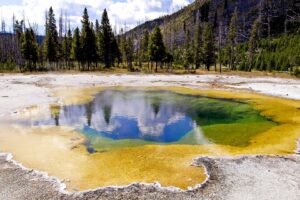One of the most important services provided by ecosystems is the regulation of the Earth’s climate. Forests, oceans, and other natural habitats are able to absorb carbon dioxide from the atmosphere, helping to mitigate the effects of climate change. Ecosystems also regulate temperature, humidity, and precipitation, creating a stable and habitable environment for human life.
In addition to regulating the climate, ecosystems also play a key role in providing clean air and water. Plants, trees, and other vegetation absorb pollutants and filter contaminants from the air and water, helping to keep the environment clean and healthy. Wetlands and mangroves act as natural filtration systems, cleaning water and providing habitat for a diverse range of species.
Ecosystems are also essential for providing food and resources for human populations. Agriculture relies on healthy ecosystems, such as fertile soil, clean water, and pollinators, to produce the food that we eat. Biodiversity in ecosystems also provides resilience to crops, making them more resistant to diseases and pests. Forests, oceans, and other ecosystems also provide valuable resources such as timber, fish, and minerals that are essential for human well-being.
Furthermore, ecosystems play a crucial role in supporting human health and well-being. Many medicines and pharmaceuticals are derived from plants and animals found in nature. Indigenous peoples have long relied on traditional knowledge of plants and herbs for healing purposes. Being in nature has also been shown to have positive effects on mental health, reducing stress and anxiety and improving overall well-being.
Unfortunately, human activities such as deforestation, pollution, and overexploitation are threatening the health and integrity of ecosystems around the world. Climate change is also posing a significant threat to the stability of ecosystems, with rising temperatures and extreme weather events affecting natural habitats and the species that rely on them.
It is essential that we protect and conserve ecosystems in order to continue receiving the essential services they provide to humans. Sustainable land use practices, conservation efforts, and policy measures can help to ensure the health and functioning of ecosystems for future generations. By recognizing the importance of ecosystems and their services, we can work towards a more sustainable and harmonious relationship with the natural world.
































Add Comment